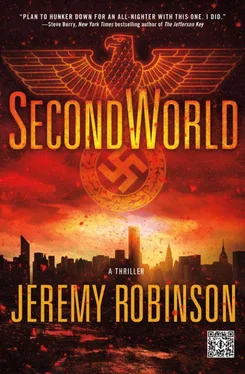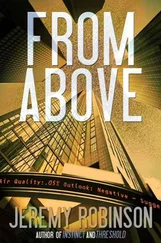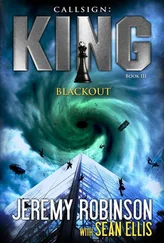She struggled, but Murdock held her tight.
Miller could tell he was being goaded into action. They wanted him to lose his cool, to seal his own fate. He wouldn’t give them the satisfaction. “If I’m dead, who are you going to torture? Or experiment on? Just admit it, Brodeur. I’ve seen the way you look at me. You’d miss me.”
When Murdock, who was notorious for his gay jokes, burst out laughing, Brodeur’s face turned red and angry.
Miller realized he might have gone too far.
Brodeur looked down the sight of his weapon.
The hammer tilted back as Brodeur slowly pulled the trigger.
“Wait,” said a voice behind Miller. The man’s voice was cold and demanded authority.
Brodeur held his fire, the hammer half cocked.
“He is right,” the voice said. “This one has earned a slow death. Make it… agonizing.”
Miller turned slowly and came face-to-face with Hans Kammler. The man looked just like he did in the few photos there were of him, but the scarring Adler mentioned marred his skin. He wore a tall general’s cap featuring an open-winged eagle perched upon a swastika. Aside from the number of pins, his uniform matched Miller’s.
“The uniform you wear belonged to General Karl Friedrich, a friend of mine.” Kammler circled Miller. “He survived the war. Spent a lifetime frozen in a cryogenic chamber. He rejoined us just ten days ago. Do you know how that makes me feel?”
Miller saw that Kammler was inspecting him from head to toe, the way a slaughterhouse worker might inspect a cow. If Vesely didn’t come through, he couldn’t imagine the kinds of things this man might do to him before killing him. Hell, they could keep him alive and torture him for years if they wanted to.
Miller decided he couldn’t possibly make the situation any worse, and said, “If the rest of your men fight like Friedrich, then I shouldn’t have any problem taking care of the rest of you with my bare hands.”
Kammler looked him in the eyes. It was like looking into the eyes of a great white shark. But Miller held his gaze and waited for a punch. It never came. Kammler continued to circle him.
“Did you take pleasure in killing those people?” Kammler asked, motioning to the hallway. Miller thought of the people in the atrium. He didn’t take pleasure in their deaths. But he didn’t feel guilty about it, either.
Kammler took his silence as a yes. “You are more like us than you admit. I doubt you would shed a single tear if every person in this facility were killed.”
“That’s exactly what’s going to happen,” Miller said, his temper flaring.
Kammler smiled. “As I thought. There are nearly three thousand adults living here.”
Miller shrugged, but then registered the man’s words. Three thousand adults. He’d been expertly baited and trapped.
“There are also five hundred children, seventy-five of them under two years of age. Surely, you would spare them?”
Miller gritted his teeth, remembering the girl he’d failed to save all those years ago. He’d nearly given his life to save hers. Children were innocents. They didn’t deserve to die. But in war, sometimes the wrong people died, hopefully so more people could live. In this case it was a no-brainer. The children living here had to die so that billions could live. Their parents sealed their fates when they decided to take part in genocide; the burden of the children’s deaths belonged to them. But he didn’t answer. He wouldn’t give Kammler the satisfaction.
“Bring them,” Kammler said, walking toward the control center.
Miller was pushed forward at gunpoint. He followed Kammler, who stopped when the full array of viewscreens could be seen.
Kammler opened his arms up to the screens, which showed a variety of live video feeds from around the world. A large, ten-foot screen showed the skyline of London masked by a red haze. The smaller screens to either side of the large screen showed several other cities around the world, all cloaked by red flakes falling from the sky. “Behold the birth of SecondWorld,” Kammler said with a grin. “It is beautiful. Purifying blood from the sky.”
Miller stayed silent.
“What we are doing is no different than what you would like to do here. You would exterminate every last one of us. Because we are your enemy. But this will not happen, do you know why?”
Silence.
“Because we are stronger. We are smarter.” Kammler’s strident voice became thoughtful. “We are… pure.”
Miller stayed silent, but Adler couldn’t. “Germany lost the Second World War.”
Kammler grinned. “Did we?” He let the question hang in the air for a moment. Brodeur and Murdock shared a laugh.
“We discovered the iron cloud that made this possible long before the ‘end’ of the war. After calculating when the iron cloud would arrive, we began work on several projects that resulted in this.” He motioned to the screens. “Germany did not lose the war, we merely pretended to.”
Miller’s jaw dropped a little. “Millions died.”
“A convincing ruse. We fought to the end. The Führer killed himself.” Kammler chuckled. “And the United States somehow ended up with thousands of Nazi scientists.”
“You sent our people to their deaths,” Adler said.
Kammler grinned at Adler. “So much like your grandmother. Surely you must understand the sacrifice now?” Kammler said. “We traded our country for the world.” Kammler looked at his watch. “Thirty minutes from now, the air will become poisonous. A few hours later, there will be no oxygen. And in several months, when the oxygen in the lower atmosphere is replenished, the world will be purified and the Fourth Reich will rise. We have waited seventy years for this day.”
Kammler turned to Miller. “Still nothing to say?”
Miller just stared at the man, willing Vesely to come through soon.
“Where does he live?” Kammler asked.
“Washington,” Brodeur replied.
Kammler barked an order toward the group of men seated at the control center. None of the men even glanced up. They were either very disciplined or used to being shouted at. An image of the Washington, D.C., skyline appeared on the large viewscreen. The Capitol building and Washington Monument were all in the shot, but were hard to see through the red haze.
“This is your home,” Kammler said, noting Miller’s lack of reaction. He shrugged, growing bored of his game.
“Don’t forget the girl,” Brodeur said. “Pitiful little thing. She worshiped you. Thought you would save her. Thought you would—”
Miller moved like lightning, striking Brodeur’s face with a backhand that sent him sprawling.
Kammler was equally quick. The punch came hard and fast. Miller shouted in pain, dropped down on one knee, and clutched his arm. With a single blow, Kammler had managed to strike both bullet wounds. How the hell did he know? Miller realized he must have been holding the arm differently. He’d done well ignoring the pain, but his body still reacted to it.
Murdock was chuckling again. The laugh concealed a second sound that Miller only heard because he’d been listening for it. Been praying for it.
The large vents overhead were no longer blowing air into the chamber.
They were sucking air out.
Kammler took hold of Miller’s face with one hand and pointed a gun at him with the other. Miller fumed with anger. “There you are,” Kammler said. “Defiant. Angry. Amusing. You will be a gift—”
Miller glared at Kammler.
“—for Mein Führer.”
Kammler shoved Miller’s face away, stepped back, and wiped his hand with a kerchief.
Miller grunted as he got to his feet. He held his arm, which had begun to bleed. The pain nauseated him. Exhaustion consumed him. He drew in a deep breath. Then another. And another. Then he stood tall and said, “I’ll be sure to say hello to him for you.”
Читать дальше












